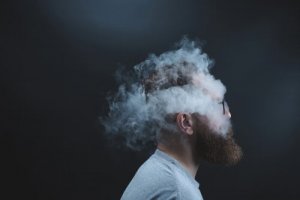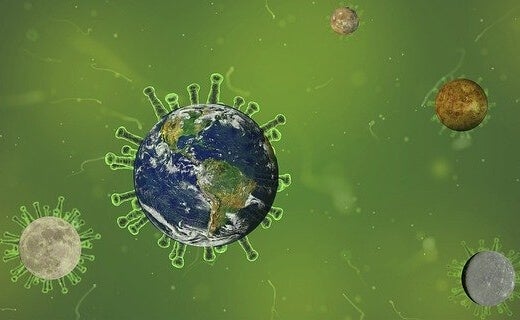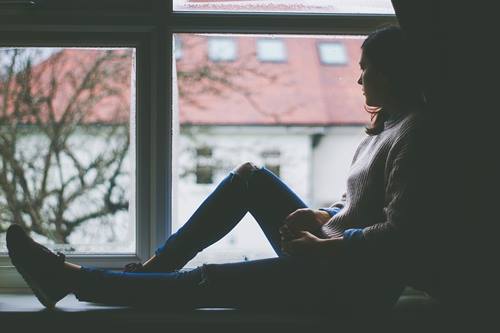Pandemic Denial: People Who Don't Accept Reality


Written and verified by the psychologist Valeria Sabater
In the middle of the world coronavirus crisis, a curious phenomenon is occurring. We’re talking here about pandemic denial, those who deny there’s a pandemic. Dignitaries and regular people, who, even today, still don’t see and accept just how serious the situation is. It’s true that this type of behavior has always occurred, but, in emergency contexts like the present one, it continues to surprise us.
A few weeks ago, Boris Johnson, the Prime Minister of the United Kingdom, called for the implementation of the “herd immunity” strategy. In other words, to allow the population to move freely so that a large part of it contracts the disease, thus favoring natural immunity. Later, he was informed that, if he followed that strategy, half a million Britons would die. Forced confinement has now been imposed in that country.
We could give other notable and equally striking examples. Andrés Manuel López Obrador, president of Mexico, encouraged his people to “go out to eat, live their lives in a normal way, and to continue holding public events so that the economy could flow”. The irresponsibility of these prominent people can be devastating in the short and long term.
Obviously, we know that, in a matter of days, many of these leaders will end up applying restrictive measures. Putin is another case in point. A few days ago, he denied that there was an epidemic in his country. However, he has now put his country in lockdown. However, in many of these cases, the damage may have already been done and the health impact will be tremendous.

Psychology of pandemic denial – why?
Denial of the pandemic doesn’t occur exclusively in the political sphere. What’s perhaps most serious is how, at an individual level, many people are breaking out of confinement and defying the measures imposed on them.
We could say that they’re simply irresponsible. However, from a psychological point of view, this fact arouses great interest in several ways.
While a good part of the population experiences fear and anguish in the presence of an unknown virus, others don’t take it seriously.
Moreover, although the images of hospitals struggling to cope in many cities, life and death decisions, and the number of infected people and deaths increasing by the hour, some people still perceive this with indifference.
What’s the explanation behind the pandemic denial phenomenon?
Attribution error and the theory of mind
The theory of mind tells us that human beings are capable of attributing thoughts and intentions to other people. We try to understand and predict what other people are thinking and how they’ll react in certain situations and circumstances. Well, within this framework, there’s a peculiarity: the attribution error.
It occurs when we think that other people are acting wrongly or overreacting. Experts tell us that, sometimes, our brains fail to apply the most important instinct in human beings: the instinct of survival. To understand this better, we’ll give an example.
Imagine that you saw a hundred gazelles running like crazy and you thought how stupid they were to do that. If they carry on like that, they’ll just cause a stampede! However, you don’t take into account that maybe these animals are running because there’s a dangerous predator chasing them.
Individual welfare versus group protection/preservation of the economy
Another effect that explains the denial of the pandemic is the sense of preservation. However, here we can differentiate two typologies, that of the individual and that of the state.
On the one hand, some people prioritize their well-being above all else. They aren’t willing to change their lifestyle.
There are many who think that the coronavirus is just like a simple flu or that it won’t even affect them at all. They minimize the risk and don’t consider any of the dangers of infecting others. They think that they’ll never suffer at all from the disease and that there’s no way they’ll ever be responsible for infecting others and even causing human losses.
There’s also the case of prominent politicians who aren’t willing to stop the economy. They take the stance that the impact of bringing their country to a standstill would be worse at an economic level than at a human level.

The effect of unreality as an explanation for the denial of the pandemic
The denial of the pandemic is, in turn, explained by a curious, but compelling, dimension. We’re talking here about the effect of unreality, often called derealization.
These people get up in the morning. The sun is shining, they’ve got an internet connection, food in the fridge, and people around them. They ask themselves: Why should I believe there’s a contagious virus taking many lives?
The word pandemic is, for many, an idea from times past. Moreover, people almost take for granted that, in a world as advanced as ours, we’ll find a rapid response to this problem. They naively assume that the experts will solve everything in a matter of days.
Added to this illusory reasoning is the fact that a large part of the population is used to seeing the world from the window of social networks. On them, everything is distant. You can’t touch it, you can’t smell it, you can’t feel it, and it’s harmless. It’s like watching a Netflix movie.
Loss and illness seem to be far from home and our daily lives. Derealization takes its toll on many people. People who are incapable of accepting how serious things are, and, worst of all, their need to act responsibly. Let’s be clear that whoever isn’t acting now is already too late.
Denial of the pandemic costs lives and that means that it’ll take longer to stop it. Do your part and stay home!
In the middle of the world coronavirus crisis, a curious phenomenon is occurring. We’re talking here about pandemic denial, those who deny there’s a pandemic. Dignitaries and regular people, who, even today, still don’t see and accept just how serious the situation is. It’s true that this type of behavior has always occurred, but, in emergency contexts like the present one, it continues to surprise us.
A few weeks ago, Boris Johnson, the Prime Minister of the United Kingdom, called for the implementation of the “herd immunity” strategy. In other words, to allow the population to move freely so that a large part of it contracts the disease, thus favoring natural immunity. Later, he was informed that, if he followed that strategy, half a million Britons would die. Forced confinement has now been imposed in that country.
We could give other notable and equally striking examples. Andrés Manuel López Obrador, president of Mexico, encouraged his people to “go out to eat, live their lives in a normal way, and to continue holding public events so that the economy could flow”. The irresponsibility of these prominent people can be devastating in the short and long term.
Obviously, we know that, in a matter of days, many of these leaders will end up applying restrictive measures. Putin is another case in point. A few days ago, he denied that there was an epidemic in his country. However, he has now put his country in lockdown. However, in many of these cases, the damage may have already been done and the health impact will be tremendous.

Psychology of pandemic denial – why?
Denial of the pandemic doesn’t occur exclusively in the political sphere. What’s perhaps most serious is how, at an individual level, many people are breaking out of confinement and defying the measures imposed on them.
We could say that they’re simply irresponsible. However, from a psychological point of view, this fact arouses great interest in several ways.
While a good part of the population experiences fear and anguish in the presence of an unknown virus, others don’t take it seriously.
Moreover, although the images of hospitals struggling to cope in many cities, life and death decisions, and the number of infected people and deaths increasing by the hour, some people still perceive this with indifference.
What’s the explanation behind the pandemic denial phenomenon?
Attribution error and the theory of mind
The theory of mind tells us that human beings are capable of attributing thoughts and intentions to other people. We try to understand and predict what other people are thinking and how they’ll react in certain situations and circumstances. Well, within this framework, there’s a peculiarity: the attribution error.
It occurs when we think that other people are acting wrongly or overreacting. Experts tell us that, sometimes, our brains fail to apply the most important instinct in human beings: the instinct of survival. To understand this better, we’ll give an example.
Imagine that you saw a hundred gazelles running like crazy and you thought how stupid they were to do that. If they carry on like that, they’ll just cause a stampede! However, you don’t take into account that maybe these animals are running because there’s a dangerous predator chasing them.
Individual welfare versus group protection/preservation of the economy
Another effect that explains the denial of the pandemic is the sense of preservation. However, here we can differentiate two typologies, that of the individual and that of the state.
On the one hand, some people prioritize their well-being above all else. They aren’t willing to change their lifestyle.
There are many who think that the coronavirus is just like a simple flu or that it won’t even affect them at all. They minimize the risk and don’t consider any of the dangers of infecting others. They think that they’ll never suffer at all from the disease and that there’s no way they’ll ever be responsible for infecting others and even causing human losses.
There’s also the case of prominent politicians who aren’t willing to stop the economy. They take the stance that the impact of bringing their country to a standstill would be worse at an economic level than at a human level.

The effect of unreality as an explanation for the denial of the pandemic
The denial of the pandemic is, in turn, explained by a curious, but compelling, dimension. We’re talking here about the effect of unreality, often called derealization.
These people get up in the morning. The sun is shining, they’ve got an internet connection, food in the fridge, and people around them. They ask themselves: Why should I believe there’s a contagious virus taking many lives?
The word pandemic is, for many, an idea from times past. Moreover, people almost take for granted that, in a world as advanced as ours, we’ll find a rapid response to this problem. They naively assume that the experts will solve everything in a matter of days.
Added to this illusory reasoning is the fact that a large part of the population is used to seeing the world from the window of social networks. On them, everything is distant. You can’t touch it, you can’t smell it, you can’t feel it, and it’s harmless. It’s like watching a Netflix movie.
Loss and illness seem to be far from home and our daily lives. Derealization takes its toll on many people. People who are incapable of accepting how serious things are, and, worst of all, their need to act responsibly. Let’s be clear that whoever isn’t acting now is already too late.
Denial of the pandemic costs lives and that means that it’ll take longer to stop it. Do your part and stay home!
This text is provided for informational purposes only and does not replace consultation with a professional. If in doubt, consult your specialist.







